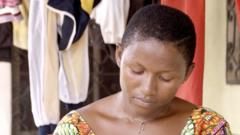The conflict in Cameroon, which has persisted for nearly a decade, deepens with every passing day, particularly for those living in the English-speaking regions of the country. Communities find themselves trapped as separatist movements clash violently with government troops, leaving tragic tales of loss and fear. One poignant story is that of Ngabi Dora Tue, who has been grieving the loss of her husband, Johnson Mabia, for four years after he was brutally murdered by armed separatists.
Dora recalls the harrowing details of Johnson's abduction: while on a work trip, he and his colleagues were taken hostage by militants demanding a ransom of more than $55,000—an impossible sum for Dora. The news of his murder came agonizingly fast, leaving her unable to process the enormity of her loss and thrusting her into a daunting future as a widow with children to raise.
The roots of this violent conflict trace back to 2016, when protests began due to the perceived oppression of the English-speaking population within a predominantly Francophone nation. As tensions rose, so too did the brutality of the government’s response, leading to mass arrests, violence, and increasing disenfranchisement among the anglophone minority.
Felix Agbor Nkongho, a prominent lawyer and activist formerly jailed for his role in the protests, asserts that both the government and separatists now operate without regard for the suffering of civilians. The credibility of separatists has dwindled as violence and abuses proliferate on all sides, eroding any sense of safety or protection among the local populace.
Reports from journalists like Blaise Eyong highlight daily horrors: bodies left in the streets, houses ablaze, and families torn apart by violence. The conflict has significantly disrupted the lives of nearly five million people, with accusations of human rights violations directed at both government forces and separatist groups, creating a landscape of fear and hopelessness.
Education has also been severely impacted, with many schools forced to close due to the violence. The damaging long-term effects of this interruption threaten the future of an entire generation, making the road to recovery even more challenging.
Compounding the complexity are splinter groups within the separatist movement, targeting their peers in an effort to expand control, thus intensifying an already fraught situation. Survivors recount horrific experiences of abduction, torture, and the grim realities that come with living in constant fear.
As narratives of loss and survival unfold, the situation in Cameroon remains dire. The conflict continues to claim lives and shatter communities, leaving families like that of Ngabi Dora Tue navigating an uncertain future while yearning for peace amidst chaos. Efforts for dialogue and resolution have thus far proven futile, and both local and international stakeholders search for a way to break this devastating cycle of violence.



















